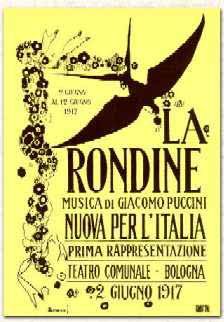
La rondine
La rondine (The Swallow) is an opera in three acts by Giacomo Puccini to an Italian libretto by Giuseppe Adami, based on a libretto by Alfred Maria Willner and Heinz Reichert. It was first performed at the Grand Théâtre de Monte Carlo (or the Théâtre du Casino) in Monte Carlo on 27 March 1917.
For the 2002 song by Mango, see La rondine (song).La rondine
Composition history[edit]
In autumn 1913, the directors of Vienna's Carltheater commissioned Puccini to compose a Viennese operetta. After confirming that it could take the form of a comic opera with no spoken dialogue in the style of Der Rosenkavalier, "only more entertaining and more organic,"[1] he agreed. The work proceeded for two years, sometimes intensely, sometimes with great difficulty, and in spring 1916 the opera was finished. The originally intended Viennese première was impeded by the outbreak of World War I and the entrance of Italy in the Alliance against Austria-Hungary, hence the Opéra de Monte-Carlo was chosen as the location to present it, with Gilda dalla Rizza and Tito Schipa in the leading roles. A feature of the music is Puccini's use of modern dance rhythms, such as the tango, to denote the various characters.[2]
In Italy, Puccini offered the work to his editor Tito Ricordi, who declined to buy it, dismissing it as "Bad Lehár";[2] thus Ricordi's rival, Lorenzo Sonzogno, obtained the right to give the first performance outside Austria-Hungary and moved the premiere to Monégasque neutral territory. At the premiere in Monte Carlo in 1917 the initial reception by the public and press was warm. However, despite the artistic value of the score, La rondine has been one of Puccini's less successful works; "In box office terms, [it] was the poor cousin to the other great hits."[1] There is no established final version of it, Puccini being dissatisfied, as often, with the result of his work; he revised it many times to the point of making three versions (1917, 1920, 1921), with two completely different endings, but died before clearly deciding on a final version.
Subsequent performance history[edit]
Revised versions[edit]
In the second version, which was premiered at Teatro Massimo, Palermo, in 1920, Prunier is the deciding force in Magda's decision to leave Ruggero in Act 3, and she departs without seeing her lover. In the third version of the opera, Puccini changed the final act again, adding a scene in which Rambaldo comes to beg Magda to return to him, and ending with Ruggero's discovery (via an anonymous telegram) of who Magda really is, his angry rebuke of her, and his decision to leave her for ever. At the end of this version, Magda is left alone with Lisette.[3] The third version was not heard until 1994 in Turin. Moreover, a fire at Casa Sonzogno archives caused by Allied bombing during the war destroyed parts of the score which had to be restored based on the surviving vocal-piano arrangements. The orchestration of the third version was finally completed in authentic Puccinian style by the Italian composer Lorenzo Ferrero at the request of Teatro Regio di Torino and subsequently performed there on 22 March 1994.
The American premiere of La rondine took place at the Metropolitan Opera in New York City on March 10, 1928; Lucrezia Bori sang the role of Magda and Beniamino Gigli appeared as Ruggero. As part of a 1958 celebration marking the centenary of Puccini's birth, the Teatro di San Carlo at Naples, Italy, staged a revival of La rondine, at that time one of Puccini's least performed operas. The revival was well received, with audiences and critics deeming it a success.[4]
Modern-day performances[edit]
In Europe since the 1990s stagings have included the première of the third version at Teatro Regio di Torino (1994), as well as performances at La Scala (1994), Leeds Opera North (1994, 2001), Oper Bonn and Ludwigshaven State Opera House (1995), Teatro del Giglio in Lucca (1998), Teatro Filarmonico di Verona (2002), Kansallisooppera, Helsinki (2002, 2003, 2007), Royal Opera House, Covent Garden, London (2002, 2005, 2013), Théâtre du Châtelet, Paris (2005), Opéra de Monte-Carlo (2007), La Fenice in Venice (2008), 2012 Teatro Nacional de Sao Carlos (2012), and Portuguese Symphony Orchestra.
In the US, major productions were seen at the New York City Opera (1984), Washington National Opera (1998), Los Angeles Opera (2000, 2008), Atlanta Opera (2002), Boston Lyric Opera (2003), , Dallas Opera (2007), San Francisco Opera (2007), Sarasota Opera (2008), the Metropolitan Opera (2008, 2014), and Opera San José (2017).
Marta Domingo's production of La rondine in Bonn in 1995 used the third version, but added to the tragedy by having Magda commit suicide by drowning in the final bars of the opera. This version of the opera has since been staged by the Washington National Opera and the Los Angeles Opera.[5]
Following the premiere of a joint new production by director Nicolas Joël at the Royal Opera House in 2002 (starring soprano Angela Gheorghiu as Magda) and at the Théâtre du Capitole de Toulouse, La rondine was seen at the Théâtre du Châtelet, revived at the Royal Opera House in 2005 and 2013, and presented by the San Francisco Opera in 2007,[6] all with Gheorghiu. On 31 December 2008, again with Gheorghiu as Magda, the Metropolitan Opera in New York gave the company's first staging in 70 years. The matinée performance on 10 January 2009 was broadcast in HD to movie theaters and schools throughout the world. This opera also was performed by Des Moines Metro Opera (Indianola, IA) in July 2012, starring Joyce El-Khoury.
Notes
Sources